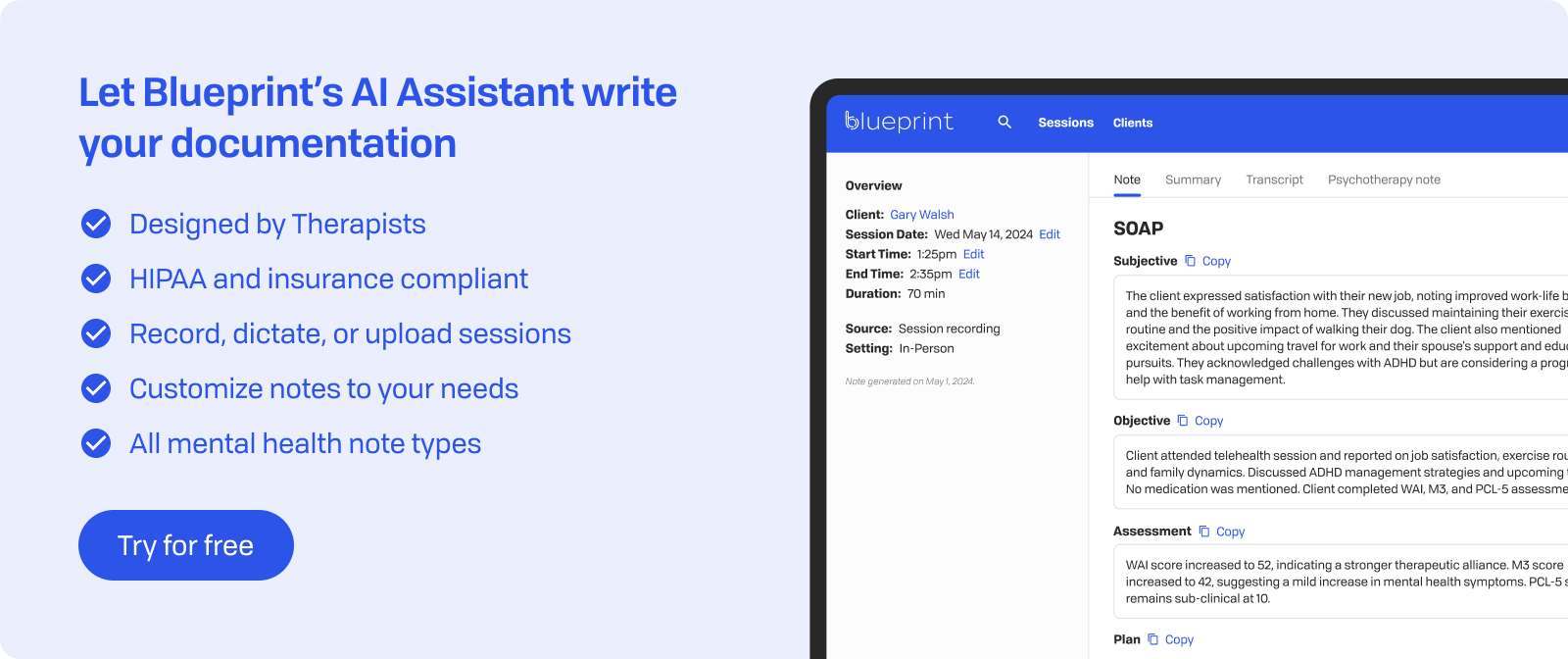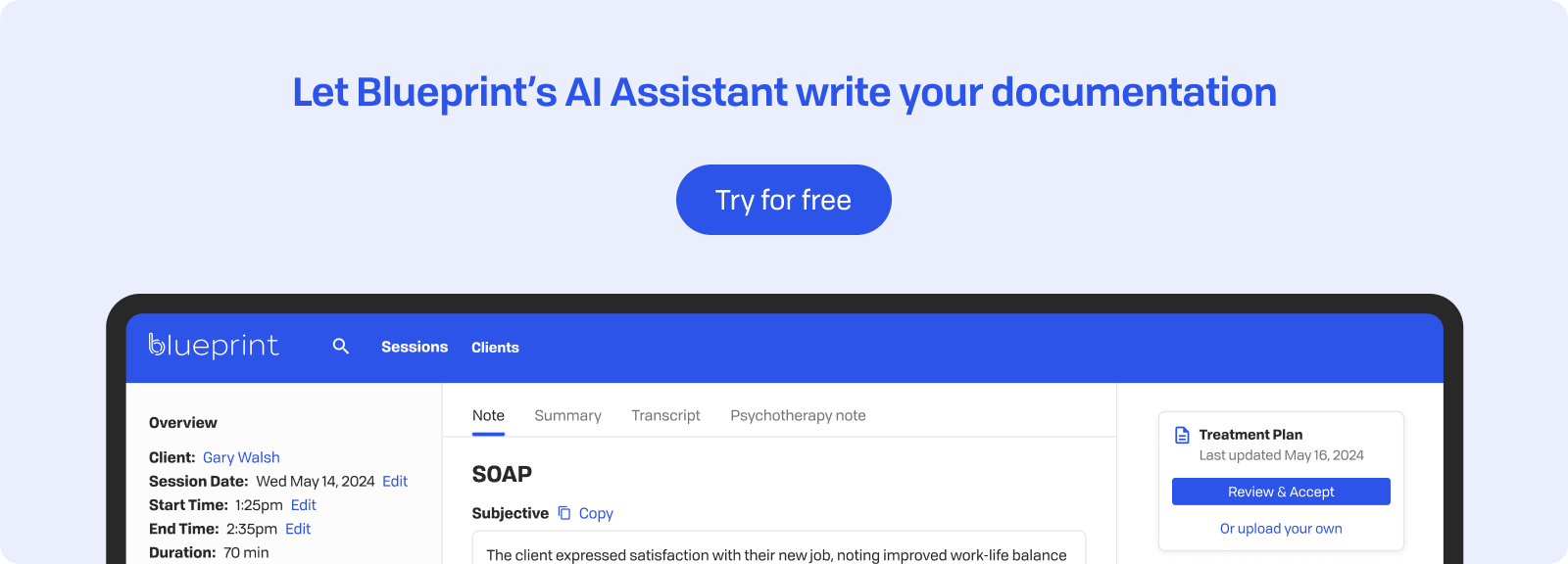In Brief
If you're reading this, you probably manage client sessions, insurance paperwork, marketing, and administrative tasks all in one day. Running a therapy practice means juggling multiple roles, often switching between clinician, administrator, and business owner within minutes. This constant role-switching exhausts and becomes unsustainable.
Many therapists think they must handle everything themselves to maintain quality and control. Yet this mindset often leads to working evenings and weekends, feeling overwhelmed, and providing less focused care to clients. Ironically, trying to do everything often means accomplishing less of what truly matters.
Effective delegation isn't about avoiding responsibilities. It's about strategically distributing tasks to make room for what you do best—providing excellent therapeutic care. When done thoughtfully, delegation supports both practice sustainability and clinical excellence.
Identifying What to Delegate
Since it can be a little overwhelming to figure out what to delegate, here is a quick way to get started:
- Create a detailed list of every task you handle in a typical week. Include everything from client documentation and scheduling to social media posts and supply ordering. Don't judge or filter during this brainstorming phase—just record every responsibility that comes your way.
- Next, sort these tasks into three categories.
- "Clinical must-dos" include direct client care, treatment planning, and clinical supervision that require your expertise.
- "Potential delegation" covers tasks others could handle with proper training, like appointment scheduling or insurance verification.
- "Non-negotiable clinical work" involves legally required activities only you can perform, such as signing notes, or collaborating on care.
Remember, many administrative and repetitive tasks don't need your clinical training. Responding to initial inquiry emails, managing your practice's social media presence, or organizing client files are important but don't use your therapeutic skills. These tasks often take hours each week that could be spent on client care or professional development.
It can be helpful to consider which activities drain your energy versus those that energize you. Often, the burdensome tasks are ideal for delegation. Administrative duties like data entry, appointment reminders, and billing follow-ups typically fit this category.
Remember, delegation doesn't mean you lose quality control. You can oversee and maintain standards while allowing others to handle execution. This shift from doing to overseeing might feel uncomfortable initially, but it's vital for sustainable practice growth.

Assessing Team Strengths and Delegation Fit
To assess who might be best suited for these different tasks, begin by watching your team members during the day to identify their natural strengths and preferences. Pay attention to who naturally takes on certain tasks, shows patience with detail-oriented work, or excels in interpersonal communication. These observations offer valuable insights for assigning tasks to the right individuals.
Use a variety of assessment methods to gain a complete understanding:
- Direct observation: Monitor how team members handle their current responsibilities, noting their efficiency and enthusiasm.
- Self-assessments: Encourage staff to rate their confidence and interest in different task categories.
- Trial assignments: Assign small, low-risk tasks to test capabilities before handing over larger responsibilities.
- Open conversations: Discuss career interests and skill development goals during regular check-ins.
Administrative tasks are a good starting point for delegation. Tasks like appointment coordination, insurance verification, and billing follow-ups have clear processes and measurable results. These assignments help build mutual confidence—you learn to rely on your team's abilities while they gain competence in new areas.
Thoughtfully match tasks to individual strengths:
- Detail-oriented staff: Handle insurance claims, documentation review, and data entry.
- Strong communicators: Take on client intake calls, appointment reminders, and follow-up correspondence.
- Tech-savvy team members: Manage electronic health records and online scheduling systems.
- Organized individuals: Oversee supply ordering, file management, and office coordination.
Keep in mind that interest is as important as skill. A team member who enjoys interacting with clients will likely excel at intake procedures, while someone who prefers behind-the-scenes work might thrive in managing billing processes. Aligning tasks with preferences leads to better outcomes for everyone involved.
Clarity in Instructions, Goals, and Outcomes
Clear communication forms the foundation of successful delegation. When assigning tasks, provide three key elements: what needs to be done (task description), why it matters (goal), and what success looks like (desired outcome). This approach prevents misunderstandings and empowers your team to take ownership of their responsibilities.
Focus on delegating outcomes rather than micromanaging steps. Instead of saying "call these five insurance companies," try "ensure all pending claims from last week are resolved." This method encourages problem-solving and allows team members to find their own efficient ways to complete tasks.
Use the SMART goals criteria to structure your delegated tasks:
- Specific: "Process intake forms for new clients" instead of "help with paperwork"
- Measurable: "Complete verification for 15 insurance claims" rather than "work on billing"
- Achievable: Consider current workload and skill level when setting expectations
- Relevant: Connect tasks to practice goals, like improving client satisfaction or reducing wait times
- Time-bound: Set clear deadlines, such as "by end of business Thursday"
Explain how each task fits into your practice's bigger picture. When your administrative assistant understands that timely insurance verification directly impacts client access to care, they're more likely to prioritize and take pride in their work. Share the reasoning behind tasks to foster engagement and creativity in problem-solving.
Document these expectations in writing, whether through email, task management software, or shared documents. This creates a reference point for both you and your team member, reducing the need for repeated clarification and ensuring accountability.

Establishing Processes: SOPs, Training & Check‑Ins
Standard operating procedures (SOPs) turn delegation into a reliable system rather than guesswork. Begin with simple, one-page documents that outline the key steps for each task you delegate. These don't have to be perfect right away—start with a basic version and improve it based on actual use.
Focus your initial SOPs on tasks that occur frequently:
- Client intake procedures: Step-by-step process from initial contact to the first appointment
- Insurance verification: Clear checklist for confirming coverage and benefits
- Appointment scheduling: Guidelines for booking, rescheduling, and managing cancellations
- End-of-day closing tasks: Routine for securing files, checking messages, and preparing for the next day
Pair written SOPs with hands-on training sessions. Walk through each procedure together, demonstrating the task while your team member watches. Then switch roles—have them perform the task while you offer guidance. This method helps catch misunderstandings early and builds confidence through practice.
Plan regular check-ins during the first few weeks of delegation. Start with daily five-minute touchpoints and gradually move to weekly meetings as skills develop. Use these conversations to:
- Address questions before they become issues
- Identify areas where the SOP needs more detail
- Acknowledge and celebrate successful task completion
- Adjust expectations based on actual performance
Keep SOPs as evolving documents that grow with your practice. Encourage team members to suggest improvements—they often find more efficient methods through their daily work. Review and update procedures every six months to ensure they stay accurate and useful.

Feedback, Accountability, and Iteration
Use a "trust-but-verify" method when handing out tasks. Begin with close oversight for new responsibilities, checking work regularly and offering guidance. As your team member shows skill, gradually ease up on supervision. This process builds confidence while maintaining quality standards.
When it’s time for feedback, consider focusing on specific actions rather than personal traits. Instead of saying "You're careless with scheduling," try "I noticed three appointments were double-booked last week." This way, feedback is actionable and less threatening, encouraging improvement rather than defensiveness.
Structure your feedback conversations using these guidelines:
- Be timely: Address issues within 24-48 hours while details remain fresh
- Balance positives with improvements: "Your client communication has been excellent, and with more attention to insurance verification timelines, you'll handle the entire intake process smoothly"
- Invite dialogue: Ask "What challenges are you facing with this task?" to uncover obstacles you can help remove
- Set clear next steps: Establish specific goals like "Let's aim for all insurance verifications completed within two business days"
Schedule monthly reviews to evaluate your delegation system. Track which tasks run smoothly and which need adjustment. Perhaps your receptionist excels at appointment scheduling but struggles with insurance calls—this insight allows you to reassign tasks for better results.
Document what works in your practice. When a team member develops an efficient new process, update your SOPs to capture that improvement. This approach turns delegation from a static assignment into a dynamic system that evolves with your practice's needs.

Overcoming Common Hesitations and Perfectionism
The fear of delegating tasks often comes from legitimate concerns. Thoughts like "What if they mess it up?" and "I feel guilty giving my work to others" keep many therapists feeling overwhelmed. These hesitations are normal, especially when you've built your practice through personal dedication and high standards.
Start addressing these fears with simple tasks that have minimal impact on clients. Handing over responsibilities like organizing office supplies or updating contact lists lets you practice letting go without risking major outcomes. As you become more comfortable, gradually give away more complex tasks.
Try these strategies to adjust your perfectionist tendencies:
- Accept "good enough" outcomes: If a team member completes insurance verifications at 90% of your standard, it still frees up hours for client care
- Focus on the bigger picture: Small imperfections in administrative tasks rarely affect therapeutic outcomes
- View mistakes as learning opportunities: Each error helps refine your training process and standard operating procedures
- Calculate the true cost: Compare the time spent perfecting routine tasks to the value of additional client sessions or self-care
Delegating tasks doesn't mean abandoning your standards—it's recognizing that your clinical expertise is too valuable for tasks others can handle well. When you delegate effectively, you're not being lazy or careless; you're making a strategic choice to save your energy for the work only you can do. And you’re showing your staff that you trust them to do good work, which improves morale and retention within organizations.
Trust builds gradually. Each successful delegation experience shows that your practice can thrive without your involvement in every detail. This shift from doing to overseeing strengthens both your practice and your team's abilities.
Key Takeaways
Delegation changes your therapy practice from a solo effort into a sustainable, thriving system. When you assign tasks to capable team members, you create space for what matters most—providing excellent client care while maintaining your own well-being.
Your delegation plan follows these steps:
- Identify tasks to delegate: Make a comprehensive list of tasks and separate them into essential clinical duties versus tasks that can be delegated.
- Assess team fit: Match tasks to individual strengths, interests, and skill levels through observation and open dialogue.
- Clarify instructions/goals: Give clear task descriptions, explain the purpose behind each assignment, and define success metrics.
- Set up SOPs + training: Document procedures, conduct hands-on training sessions, and schedule regular check-ins.
- Provide feedback and accountability: Start with close oversight, give specific feedback, and gradually reduce supervision as competence increases.
- Adjust process: Review monthly, update procedures based on actual results, and continuously refine your delegation system.
The benefits go far beyond saving time. Effective delegation improves patient care quality, develops your team's skills, reduces operational costs, and prevents burnout that threatens many therapy practices. Your staff gains new skills and career growth opportunities while you focus on complex clinical work that requires your expertise. Each task you delegate is an investment in your practice's future and your ability to provide ongoing, high-quality therapeutic care.











